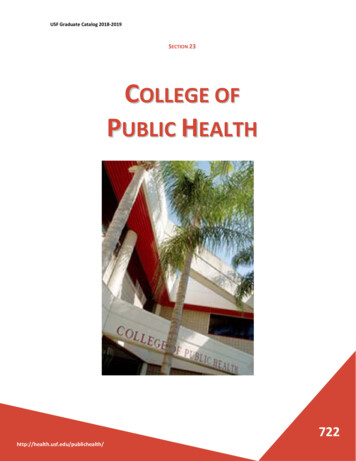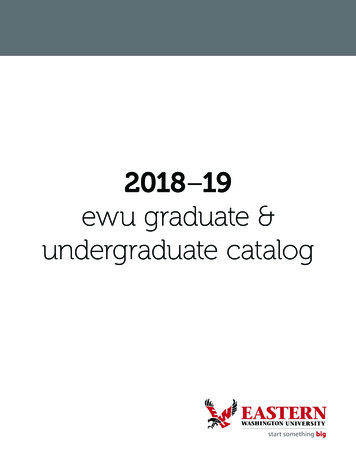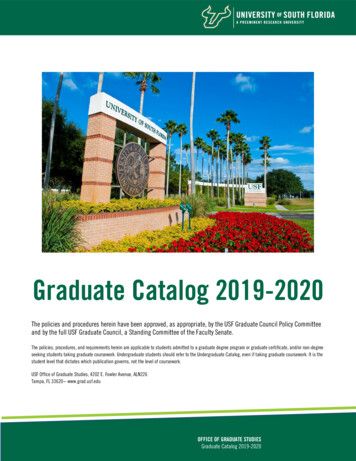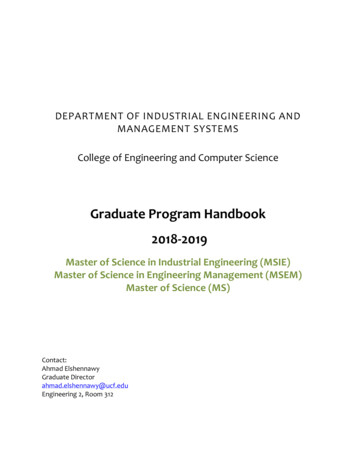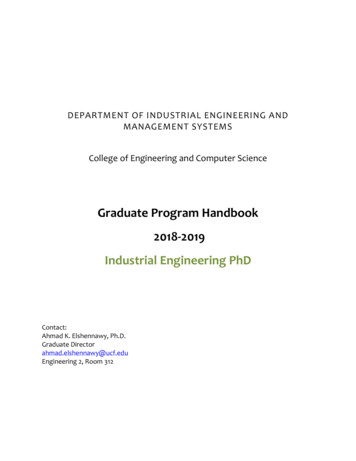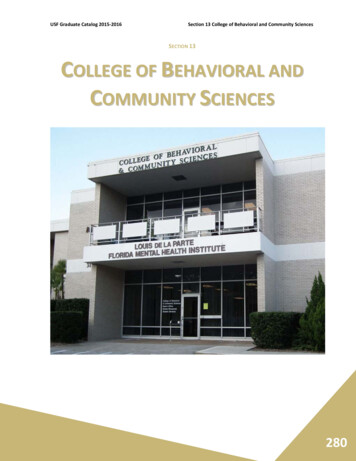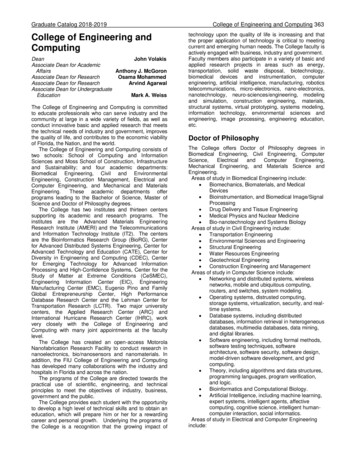
Transcription
Graduate Catalog 2018-2019College of Engineering andComputingDeanJohn VolakisAssociate Dean for AcademicAffairsAnthony J. McGoronAssociate Dean for ResearchOsama MohammedAssociate Dean for ResearchArvind AgarwalAssociate Dean for UndergraduateEducationMark A. WeissThe College of Engineering and Computing is committedto educate professionals who can serve industry and thecommunity at large in a wide variety of fields, as well asconduct innovative basic and applied research that meetsthe technical needs of industry and government, improvesthe quality of life, and contributes to the economic viabilityof Florida, the Nation, and the world.The College of Engineering and Computing consists oftwo schools: School of Computing and InformationSciences and Moss School of Construction, Infrastructureand Sustainability; and four academic departments:Biomedical Engineering, Civil and EnvironmentalEngineering, Construction Management, Electrical andComputer Engineering, and Mechanical and MaterialsEngineering.These academic departments offerprograms leading to the Bachelor of Science, Master ofScience and Doctor of Philosophy degrees.The College has two institutes and thirteen centerssupporting its academic and research programs. Theinstitutes are the Advanced Materials EngineeringResearch Institute (AMERI) and the Telecommunicationsand Information Technology Institute (IT2). The centersare the Bioinformatics Research Group (BioRG), Centerfor Advanced Distributed Systems Engineering, Center forAdvanced Technology and Education (CATE), Center forDiversity in Engineering and Computing (CDEC), Centerfor Emerging Technology for Advanced InformationProcessing and High-Confidence Systems, Center for theStudy of Matter at Extreme Conditions (CeSMEC),Engineering Information Center (EIC), EngineeringManufacturing Center (EMC), Eugenio Pino and FamilyGlobal Entrepreneurship Center, High PerformanceDatabase Research Center and the Lehman Center forTransportation Research (LCTR). Two major universitycenters, the Applied Research Center (ARC) andInternational Hurricane Research Center (IHRC), workvery closely with the College of Engineering andComputing with many joint appointments at the facultylevel.The College has created an open-access MotorolaNanofabrication Research Facility to conduct research innanoelectronics, bio/nanosensors and nanomaterials. Inaddition, the FIU College of Engineering and Computinghas developed many collaborations with the industry andhospitals in Florida and across the nation.The programs of the College are directed towards thepractical use of scientific, engineering, and technicalprinciples to meet the objectives of industry, business,government and the public.The College provides each student with the opportunityto develop a high level of technical skills and to obtain aneducation, which will prepare him or her for a rewardingcareer and personal growth. Underlying the programs ofthe College is a recognition that the growing impact ofCollege of Engineering and Computing 363technology upon the quality of life is increasing and thatthe proper application of technology is critical to meetingcurrent and emerging human needs. The College faculty isactively engaged with business, industry and government.Faculty members also participate in a variety of basic andapplied research projects in areas such as energy,transportation, solid waste disposal, biotechnology,biomedical devices and instrumentation, computerengineering, artificial intelligence, manufacturing, roboticstelecommunications, micro-electronics, nano-electronics,nanotechnology, neuro-sciences/engineering, modelingand simulation, construction engineering, materials,structural systems, virtual prototyping, systems modeling,information technology, environmental sciences andengineering, image processing, engineering education,etc.Doctor of PhilosophyThe College offers Doctor of Philosophy degrees inBiomedical Engineering, Civil Engineering, echanical Engineering, and Materials Science andEngineering.Areas of study in Biomedical Engineering include: Biomechanics, Biomaterials, and MedicalDevices Bioinstrumentation, and Biomedical Image/SignalProcessing Drug Delivery and Tissue Engineering Medical Physics and Nuclear Medicine Bio-nanotechnology and Systems BiologyAreas of study in Civil Engineering include: Transportation Engineering Environmental Sciences and Engineering Structural Engineering Water Resources Engineering Geotechnical Engineering Construction Engineering and ManagementAreas of study in Computer Science include: Networking and distributed systems, wirelessnetworks, mobile and ubiquitous computing,routers, and switches, system modeling. Operating systems, distrusted computing,storage systems, virtualization, security, and realtime systems. Database systems, including distributeddatabases, information retrieval in heterogeneousdatabases, multimedia databases, data mining,and digital libraries. Software engineering, including formal methods,software testing techniques, softwarearchitecture, software security, software design,model-driven software development, and gridcomputing. Theory, including algorithms and data structures,programming languages, program verification,and logic. Bioinformatics and Computational Biology. Artificial Intelligence, including machine learning,expert systems, intelligent agents, affectivecomputing, cognitive science, intelligent humancomputer interaction, social informatics.Areas of study in Electrical and Computer Engineeringinclude:
364 College of Engineering and Computing Biomedical Sciences and EngineeringMicro-Electronics, Nano-Electronics andPhotonics Computer Engineering Systems and Controls Electromagnetics and Nanomagnetics Power Systems Telecommunications and Networking Digital Signal and Image ProcessingAreas of study in Mechanical and Materials Engineeringinclude: Thermo/Fluids Sciences Biomedical Engineering Mechanics of Materials Nanostructured Materials Ceramics and Electronic Materials CAD/CAM Manufacturing Modeling and Simulation Nano Devices Applied MechanicsMaster of Science Degree ProgramsThe College offers Master of Science degrees in: Biomedical Engineering Civil Engineering Computer Engineering Computer Science Construction Management Cybersecurity Data Science Electrical Engineering Engineering Management Environmental Engineering Information Technology Logistics Engineering Materials Science and Engineering Mechanical Engineering Telecommunications and NetworkingDistance Learning ProgramsThe Office of Distance Education (ODE) provides accessto graduate and undergraduate level engineering coursesand programs to individual students anywhere andanytime, whether it is at home or the workplace. Coursesare delivered through streaming video over the Internet.Research Centers and InstitutesResearch spans from single discipline to multidisciplinaryresearch in the College of Engineering and Computing.Thus, the College, through its research centers andinstitutes, has established many collaborative andcooperative partnerships with other units in the universityas well as with local industry.The research units involved in these efforts include: Advanced Materials Engineering ResearchInstitute (AMERI) Applied Research Center (ARC) Center for Advanced Technology and Education(CATE) Center for the Study of Matters at ExtremeConditions (CeSMEC)Graduate Catalog 2018-2019 Engineering Manufacturing Center (EMC)Florida Center for Cyber Infrastructure Educationand Research for Trust and AssuranceHigh Performance Database Research CenterIndustry/University Cooperative Research Center(I/UCRC) Center for Advanced KnowledgeEnablement (CAKE)International Hurricane Research Center (IHRC)Lehman Center for Transportation Research(LCTR)Motorola NanoFabrication Research FacilityTelecommunications and Information TechnologyInstitute (IT2).Student Success ServicesThe office of Student Success Services is responsible forthe coordination of student services at the University.Students are informed of educational opportunities suchas scholarships, tuition waivers, and campus resources.Admission RequirementsProspective students seeking a graduate degree in theCollege must satisfy all university admission requirementsas well as the specific program requirements. Eachdepartment evaluates candidates for admission to itsprograms. Prospective students should refer to theappropriate section of the catalog for specific admissionrequirements. Contact information of the GraduatePrograms Directors can be found eprogram-directors/Admitted Student ProceduresA student who has been accepted to a degree program inthe College must meet with the Department’s GraduateProgram Director prior to the enrollment in the first class.Enrolled students must choose an advisor during theirfirst semester in the program.Continued contact (at least once per semester) with theadvisor is required to review progress and select coursesfor each succeeding semester.Courses taken without the required prerequisites andco-requisites, or without the consent of the advisor, will bedropped automatically before the end of the term, resultingin a grade of “DR” or “DF”.Scientific Laboratory Fees are assessed for certaincourses where laboratory classes are part of thecurriculum. Specific information on scientific laboratoryfees may be obtained from the University FinancialServices.Fellowships, Assistantships, and ScholarshipsThe College of Engineering and Computing offers avariety of fellowships, assistantships, and scholarships toqualified students. These awards are highly competitive;hence, prospective students are urged to apply and submitall required records and scores as early as possible sothey can be considered for these awards.The amounts of these awards vary depending on thetype of the award, but they may provide full tuition and amonthly stipend. Visit: cec.fiu.edu for additionalinformation.Policies, Requirements, and Regulations
Graduate Catalog 2018-2019College of Engineering and Computing 365The University, the University Graduate School, and theCollege of Engineering and Computing have a set ofguidelines to protect the student’s rights and to ensure atimely graduation. Students must become familiar with allUniversity, the University Graduate School, and College’sgraduate procedures. These procedures are described inthe University’s Student Handbook, this catalog and athttp://gradschool.fiu.edu.The programs, policies, requirements and regulationslisted in the catalog are continually subject to review toserve the needs of the University’s various publics, and torespond to the mandates of the FIU Board of Trustees andthe Florida Legislature. Changes may be made withoutadvance notice.Florida International University and the College adhereto opportunity practices, which conform to all laws againstdiscrimination and are committed to non-discriminationwith respect to race, color, creed, age, handicap, sex,marital status, or nationality. Additionally, the University iscommitted to the principle of taking positive stepsnecessary to achieve the equalization of educational andemployment opportunities.College of Engineering and ComputingDismissal PolicyA student who has been dismissed from the University forthe first time may see the Graduate Program Director tobegin the appeal procedure. The Director will determine ifthe student is eligible to appeal the dismissal or if there isa way to lift the dismissal. If the student is eligible, he orshe must make an appointment to see the chairperson orassociate chairperson. The student must bring a letterstating when he or she was dismissed the first time andwhat he or she is going to do to ensure that he or she isnot dismissed a second time. If the chairpersondetermines that the student is worthy of reinstatement, heor she will prepare and sign a memo for the CollegeDean’s consideration stating the conditions for the studentto be reinstated. The student may be readmitted onacademic probation upon the approval of the Dean of theUniversity Graduate School. If the student does not meetthese conditions, he or she will be dismissed a secondand final time from the program. The student must alsosign an agreement stating that he or she understands thatthe department will not allow a second reinstatement if thestudent is dismissed again.Any student who is dismissed a second time from FIUwill not be readmitted under any circumstances. Only afirst dismissal appeal is considered in the College ofEngineering and Computing, a second dismissal appealwill not be accepted.Department-Specific InformationFor additional information refer to your selecteddepartment in this catalog, or call the graduate programdirector of each department. As listed above.Other Important Contact InformationWebsite: lege of Engineering and ComputingGraduate AdmissionsCampus ResourcesCareer Services(305) 348-7442(305) 348-7442(305) 348-2522(305) 348-1281Financial AidUniversity Graduate SchoolInternational Students and ScholarsServicesRegistrar’s OfficeScholarshipsTuition Waivers(305) 348-7000(305) 348-2455(305) 348-2421(305) 348-2320(305) 348-0349(305) 348-7000Enterprise and LogisticsEngineeringChin-Sheng Chen, Professor and Program DirectorShih-Ming Lee, Professor of PracticeKaren E. Schmahl, Professor of PracticeShabnam Rezapour, Assistant ProfessorAffiliated and Research FacultyCecilia Alvarez-Ortiz, Affiliated ProfessorPaul Bianco, Affiliated ProfessorSeema Pissaris, Affiliated ProfessorJesus Sanchelima, Affiliated ProfessorMaster of Science in EngineeringManagementThe Master of Science in Engineering Management(MSEM) program develops future leaders of business andindustry in an engineering and technological environment.The program blends a carefully chosen mix of graduatecourses offered by the College of Engineering andComputing, the College of Business Administration, andthe College of Law. The MSEM program is designed tooffer a tailored degree for those engineers who would liketo advance to managerial positions and wish to acquirethe necessary knowledge and skills for success. TheMSEM program includes coursework that simulates abusiness environment where students learn and applyengineering tools, managerial theories, and best practicesto design and operate industrial systems. Students in theprogram are expected to acquire contemporaryengineering management theories and techniques, andsimultaneously build a solid technical foundation in achosen engineering track.Admission PoliciesThe applicant to the MSEM program must have abachelor’s degree in engineering or a closely related fieldfrom a regionally accredited institution with a minimum of“B” average in upper-level undergraduate work, or agraduate degree from an accredited institution. In addition,international graduate student applicants whose nativelanguage is not English are required to submit a score forthe Test of English as a Foreign Language (TOEFL) or forthe International English Language Testing System(IELTS). A total score of 80 on the iBT TOEFL or 6.5overall on the IELTS is required. The applicant whoseGPA does not meet the minimum GPA requirement maybe considered for conditional admission.For suchconsideration, the applicant must submit (1) three lettersof recommendation; (2) a resume including education,training, and employment history, practical and researchexperience (such as projects and publications), skills andother pertinent information; and (3) a statement ofobjective in which the applicant must clearly state his/her
366 College of Engineering and Computingintended engineeringinformation.track,inadditionGraduate Catalog 2018-2019tootherDegree RequirementsThe MSEM program requires 30 credit hours of coursework including 9 credit hours of engineering managementcore courses, 9 credit hours of business electives and 12credit hours of approved graduate-level electives from anengineering track.Engineering Management Core CoursesStudents in the Engineering Management program arerequired to take three courses (9 credit hours) to build anengineering management foundation that includes ement,engineeringprojectmanagement,intellectual property issues, and business laws. The threecore courses are:EIN 5226Total Quality Management ForEngineers3ESI 6455Advanced Engineering ProjectManagement3LAW 5072Business Law and Intellectual Propertyfor Engineers and Entrepreneurs3Business ElectivesStudents in the program are required to take three courses(9 credit hours) to gain fundamental knowledge aboutmanagement functions that includes topics in accounting,finance, organizational behavior, leadership, marketing,and operations management.Additional businesselectives may be considered subject to the Director’sapproval. A suggested list of business elective courses isgiven below:ACG 6026Accounting for Managers3EIN 5359Industrial Financial Decisions3EIN 6160Management of Innovation andTechnology3EIN 6325Business Plan Development3FIN 6406Corporate Finance3FIN 6425Financial Management Policies3FIN 6487Financial Risk Management- FinancialEngineering3MAN 6209Organization Design and Behavior3MAR 6805Marketing Management3MAN 6830Organization Information Systems3MAN 6501Operations Management3MAN 6167Leadership in a Global Environment3Engineering TracksStudents in the Engineering Management program mustchoose an engineering track from any academic unit in theCollege of Engineering and Computing. Within a chosentrack, students are required to take four courses (12 credithours) that meet the program’s technical requirement.These engineering electives are designed to broaden anddeepen the students’ understanding of engineering andtechnology development in a chosen track. Studentsshould have a proper educational background in order totake elective courses. Additional tracks and electivecourses may be available, subject to the approval of theEngineering Management program director.Biomedical Engineering TrackStudents in this track are required to take four coursesfrom the following list. Additional courses may be selectedwith approval of the program director.BME 5005Applied Biomedical EngineeringPrinciples3BME 5036Biotransport Processes3BME 5105Intermediate Biomaterials Science3BME 5316Molecular Bioprocess Engineering3BME 5340Introduction to CardiovascularEngineering3BME 5560Biomedical Engineering Optics3BME 5573Nanomedicine3BME 5505CEngineering Foundations of MedicalImaging Instrument3Computer Engineering TrackStudents in this track are required to take four coursesfrom the following list. Additional courses may be selectedwith approval of the program director.EEL 5718Computer Communication NetworkEngineering3EEL 5725Hardware Description Languages(VHDL or Verilog)3EEL 5757Real-Time DSP Implementations3EEL 6167VLSI Design3EEL 6253Computer Analysis of Power Systems 3EEE 6502Digital Signal Processing3EEL 6575Data Communications Engineering3EEL 6681Fuzzy System Design3Computer Science TrackStudents in this track are required to take four coursesfrom the following list. Additional courses may be selectedwith approval of the program director.CEN 5011Advanced Software Engineering3COP 5725Principles of Database ManagementSystems3COP 5614Operating Systems3COT 5310Theory of Computation I3COT 5407Introduction to Algorithms3Construction Management TrackStudents in this track are required to take four coursesfrom the following list. Additional courses may be selectedwith approval of the program director.BCN 5716Productivity in Construction3BCN 5626Construction Cost Analysis & Control3BCN 5645Construction Economic Analysis3BCN 5728Principles of Construction Scheduling 3BCN 5774Topics in International Construction3BCN 6775Decision & Risk Analysis in Construction 3BCN 6916Development in ConstructionTechnology3CCE 5505Computer Integrated Const
Distance Learning Programs The Office of Distance Education (ODE) provides access to graduate and undergraduate level engineering courses and programs to individual students anywhere and anytime, whether it is at home or the workplace. Courses are delivered through streaming video over the Internet. Research Centers and Institutes

